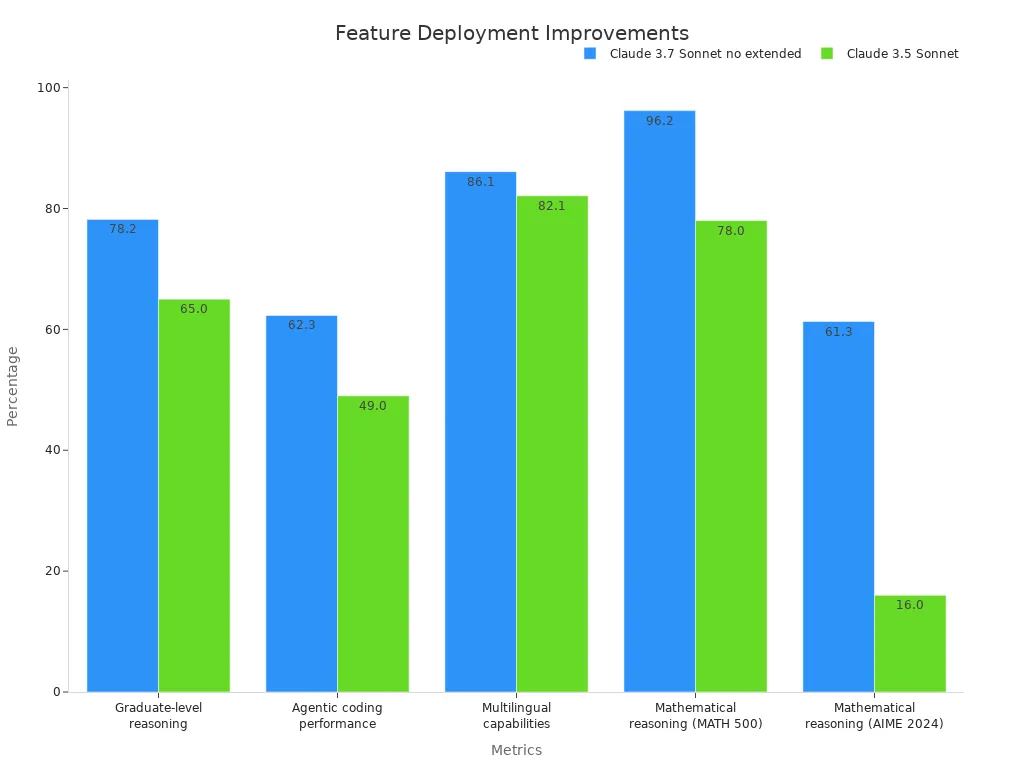Claude Sonnet 4 Redefines AI Coding and Reasoning in 2025

Hey there! Have you ever wondered how artificial intelligence is revolutionizing the way we code? Let me introduce you to Claude 4, specifically Claude Sonnet 4—it’s a true game-changer. This advanced intelligence doesn’t just generate code; it approaches problems with the expertise of a seasoned developer. It’s incredibly fast, highly scalable, and capable of understanding complex concepts, saving both time and effort.
Here’s the exciting part: Claude Sonnet 4 consistently ranks at the top on benchmarks like SWE-bench and HumanEval. It’s not just about producing code; it’s about getting it right the first time. Debugging? No problem. Fixing bugs and enhancing features has never been this seamless. Developers can now spend less time explaining instructions and more time focusing on innovation.
With Claude 4 and its Claude Sonnet 4 capabilities, coding transforms from a tedious task into a truly creative process. It’s reshaping the industry, and honestly, I can’t wait to see what’s next.
Key Takeaways
Claude Sonnet 4 changes coding by making fast, error-free code. This helps developers focus on being creative and trying new ideas.
It understands everyday language, so beginners can code easily. Hard tasks become simple steps anyone can follow.
The smart reasoning system mixes logic and AI. This helps Claude solve tough problems quickly and correctly.
Claude Sonnet 4 makes fixing code easier. It finds mistakes, explains why they happen, and shows how to fix them, like a helpful teacher.
It’s affordable and works well with current tools, making it useful for all kinds of businesses.
Core Features of Claude Sonnet 4
Claude Sonnet 4 has amazing tools that make it special. Let’s look at its main features and why they’re so helpful for developers.
Speed and Flexibility
Claude Sonnet 4 is super fast and flexible. It solves real-world coding problems, not just simple ones. This makes it great for tough projects and real use.
Here’s why it’s so fast:
It creates strong, error-free code ready to use.
It handles big coding tasks easily without slowing down.
It explains its choices clearly, so you understand its work.
Claude is also very flexible. Whether you’re making a small app or a big system, it adjusts to your needs. It scores high on tests like SWE-bench and TAU-bench. For instance, on SWE-bench, it gets a 72.7% score, matching Opus 4’s skills. On TAU-bench, it shows great tool-use efficiency.
Test Name | Score | What It Shows |
|---|---|---|
SWE-bench | 72.7% | Matches Opus 4’s coding abilities |
TAU-bench | Strong results | Proves tool-use efficiency |
This speed and flexibility make Claude Sonnet 4 a key part of modern coding.
Smart Thinking for Hard Problems
Claude Sonnet 4 is great at solving tricky problems. It doesn’t just follow steps; it understands the bigger picture. This helps it handle hard tasks easily.
For example, it can:
Break big tasks into smaller, easier parts.
Think of different ways to solve a problem.
Spot mistakes early and fix them quickly.
This smart thinking is like having an expert coder helping you. It doesn’t just solve problems; it solves them the best way. Claude checks its work before giving answers, so its solutions are accurate and thoughtful.
Easy Coding with Natural Language
Claude Sonnet 4 uses natural language to make coding simple. You can describe a task in plain English, and it turns it into perfect code.
Its natural language skills help it:
Understand what you need better than before.
Write clean, ready-to-use code.
Explain its choices in simple words anyone can follow.
This makes coding easier for everyone, even beginners. By working with tools like Amazon Bedrock, Claude Sonnet 4 brings advanced AI to more people.
In short, Claude Sonnet 4 makes coding fun and creative. It’s not just a tool; it’s like a teammate for developers.
Revolutionizing Coding and Development
Code Generation and Optimization
Claude Sonnet 4 is amazing at creating and improving code. It handles tough coding problems easily and explains its thinking clearly. It doesn’t just make code—it solves problems like an expert programmer.
Here’s why it’s special:
It finds tricky issues others might overlook.
It gives more than one solution to hard problems. For example, in a JavaScript loop test, Claude gave three solutions, while GitHub Copilot only gave two.
Its "extended thinking" feature is very helpful. It explains its choices, helping with big decisions and unclear instructions.
In tests, Claude beat GitHub Copilot in 4 out of 5 tasks. That’s what makes it a top choice for coding and problem-solving!
Bug Detection and Fixes
Debugging can be really hard, but Claude Sonnet 4 makes it simple. It doesn’t just find mistakes; it explains why they happen and how to fix them.
Here’s a comparison of how models perform in finding bugs:
Model | Prompt Type | Accuracy Rate |
|---|---|---|
Claude 3.5 Sonnet | Description + Original Script | |
GPT-4 | Description + Original Script | 80% |
GPT-4 | Description + Original Script + Specific Issue | 93.33% |
GPT-4o | Description + Original Script | 90% |
Claude is great at spotting problems in complicated code. It’s like having a super-smart helper who never misses anything.
Feature Development and Deployment
Building and launching new features is easier with Claude Sonnet 4. It speeds up the process and works well for both small apps and big systems.
Here’s how it compares to older versions:
Metric | Claude 3.7 Sonnet | Claude 3.5 Sonnet |
|---|---|---|
Graduate-level reasoning | 78.2% (no extended), 84.8% (extended) | 65.0% |
Agentic coding performance | 62.3% (no extended), 70.3% (extended) | 49.0% |
Multilingual capabilities | 86.1% (no extended) | 82.1% |
Mathematical reasoning (MATH 500) | 96.2% (no extended) | 78.0% |
Mathematical reasoning (AIME 2024) | 61.3% (no extended) | 16.0% |

With tools like Amazon Bedrock, Claude Sonnet 4 brings advanced AI to everyone. It’s not just a tool—it’s like a teammate for creating new ideas.
The Hybrid Reasoning Model

Claude Sonnet 4 improves AI reasoning with a hybrid method. It mixes symbolic reasoning and neural networks for better results. This combination helps it solve hard problems with accuracy and speed. Let me explain how it works.
Symbolic and Neural Reasoning
When I first learned about hybrid AI models, I was curious. Claude Sonnet 4 uses both symbolic reasoning and neural networks together. Symbolic reasoning follows rules, while neural networks find patterns in data. By combining them, Claude handles tasks needing logic and creativity.
For example, symbolic reasoning helps solve equations or study organized data. Neural networks are great for understanding language or spotting patterns in messy data. Together, they make Claude smart and flexible. This mix keeps it strong, even with long or real-time tasks.
Workload Optimization
Claude Sonnet 4 is amazing at making work easier. It doesn’t just finish tasks—it does them the best way possible. Whether your project is small or huge, Claude adjusts to fit your needs.
For instance, it can automate creating product lists for stores or sort shipping labels. It also pulls data from invoices, saving hours of work. This boosts productivity and reduces mistakes. Plus, it handles busy times without slowing down or losing accuracy.
Real-World Applications
The best part of Claude Sonnet 4 is how it’s used. It’s not just for developers—it helps businesses in many fields. Marketing teams use Claude to study customer data and find new groups. This leads to better campaigns and more email clicks. Some teams even track competitor changes and adjust plans quickly.
In one case, Paul Roetzer from the Marketing AI Institute shared a story. Claude finished a task in 20 minutes, giving him double or triple the value of his subscription. Impressive, right? Whether writing workshop details, making ads, or studying trends, Claude proves its worth.
Also, Claude works with Amazon Bedrock to reach more people. With Bedrock, Claude Sonnet 4 doesn’t just solve problems. It helps users create and achieve more.
Accessibility and Integration
Platform Availability
Claude Sonnet 4 is easy to use on many platforms. You can access it through Anthropic API, Amazon Bedrock, or Google Cloud’s Vertex AI. This means teams can use it in private or public clouds. It works well with setups you already have, like a universal tool.
The cost starts at $3 for every million input tokens. That’s a good deal, especially with its 200K token context window. This feature helps handle long conversations or documents without losing details. Claude Sonnet 4 was made to be simple and useful for developers and businesses.
Integration with Development Pipelines
Claude Sonnet 4 fits smoothly into coding workflows. It works for small projects or big systems, adapting to what you need. Tools like Amazon Bedrock make using it even easier.
For example, Claude can automate tasks like writing code or checking pull requests. This saves time and reduces mistakes. It also handles complex workflows, making big projects easier. It’s like having a helpful teammate ready to assist anytime.
Democratizing AI for Enterprises
Claude Sonnet 4 isn’t just for big companies. It’s built to help businesses of all sizes. Platforms like Amazon Bedrock make advanced AI available to more people. Smaller teams can use it without spending too much money.
Startups have used Claude to improve their work and compete with bigger companies. It’s great to see how this tool helps everyone succeed. Whether you’re working alone or in a large team, Claude makes AI tools easier to use for everyone.
Claude Sonnet 4 is a powerful AI tool for coding in 2025. It uses a hybrid reasoning model that mixes rules and patterns. This makes it smart and quick to solve problems. It helps users handle tough tasks, like fixing code or improving workflows.
Here’s how it compares to other models:
Feature | Claude 3.5 Sonnet | GPT-4o |
|---|---|---|
Speed | Twice as fast as Claude 3 Opus, slower than GPT-4o | N/A |
Token Processing | 3.43x better than Claude 3 Opus (23 tokens/second) | ~109 tokens/second |
Advanced Thinking | Excellent | Strong rival |
Multilingual Math | 91.6% accuracy | 90.7% accuracy |
Text Reasoning | 87.1% accuracy | 83.5% accuracy |
Coding Skills | Best among models | N/A |
Claude Sonnet 4 is great for many industries. It’s strong in advanced thinking and math across languages. While GPT-4o is better in some areas, Claude Sonnet 4 is still a favorite for developers and businesses.
AI keeps improving, and Claude Sonnet 4 leads the way. It’s more than a tool—it’s a creative and problem-solving partner.
FAQ
What makes Claude Sonnet 4 different from other AI coding tools?
Claude Sonnet 4 combines symbolic reasoning with neural networks. This hybrid approach lets it handle complex tasks with precision. It’s not just fast—it’s thoughtful. Plus, its ability to explain decisions makes it feel like working with a real teammate.
Can beginners use Claude Sonnet 4 for coding?
Absolutely! You don’t need to be a coding expert. Just describe what you need in plain English, and Claude generates clean, ready-to-use code. It’s perfect for beginners and pros alike.
Tip: Start with small tasks to see how Claude simplifies coding for you!
How does Claude Sonnet 4 handle debugging?
Claude doesn’t just find bugs—it explains why they happen and suggests fixes. It’s like having a mentor who spots mistakes and teaches you how to avoid them in the future.
Is Claude Sonnet 4 affordable for small businesses?
Yes! With pricing starting at $3 per million input tokens, it’s accessible for startups and small teams. Its efficiency saves time and money, making it a smart investment for businesses of any size.
Can Claude Sonnet 4 integrate with my existing tools?
Definitely! Claude works seamlessly with platforms like Amazon Bedrock and Google Cloud’s Vertex AI. It fits into your current workflows, whether you’re managing small projects or large systems.
Note: Integration is quick and hassle-free, so you can get started right away!
See Also
Harnessing the Power of Advanced AI: GPT-4 Turbo Insights
Discovering Top WhatsApp Bots: AI Chatbot Trends for 2024
Revolutionizing SMS Communication Through Newoaks AI Innovations
Maximizing Digital Calendar Efficiency Using NewOaks AI Solutions
Integrating AI in Social Media: Tailored ChatGPT for Snapchat

